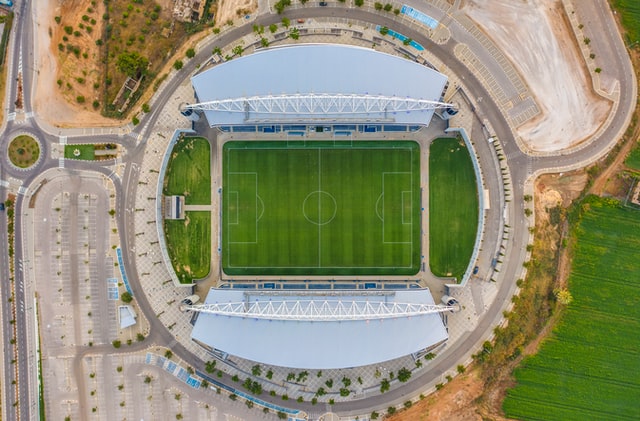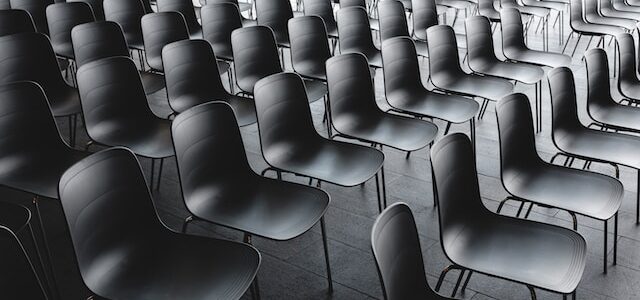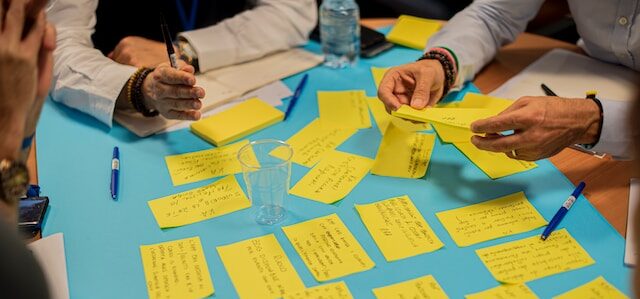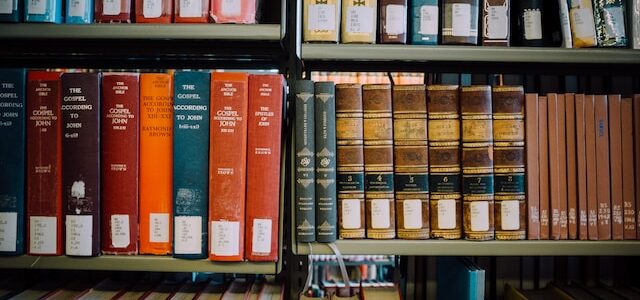We are currently conducting a survey of German soccer teams to investigate how fans travel to the stadium.
News
2nd workshop for practitioners on automated text analysis for citizen contributions
Part of the efforts of the research group is to develop tools that support the evaluation of citizen contributions from participation processes. On 10 December 2021 the research group hosted a workshop with practitioners (including local planning officials, participation officers and planning experts) to discuss our recent developments, part of which have been published in the Proceedings of the 8th Workshop on Argument Mining.
More information on the insights from the workshop is available in German.
New working group on mobility, accessibility and social inclusion at the ARL – Academy for Territorial Development in the Leibniz Association
We are pleased that Laura Mark is part of the aforementioned working group and can discuss our research with colleagues. Practitioners and researchers meet regularly in the working group to discuss various topics related to mobility and social inclusion. The working group started in the middle of 2021 and the content-related work is now taking more and more shape: Areas of interface with our research include the question of procedural justice in planning processes for the mobility transition – who participates and whose voices are heard? How should planning and participation processes for a sustainable mobility transition be designed in the future in order to include everyone? Here we will report on the further work and publications and events that develop within the context of this working group!
Robust Methods for Classifying Argument Components in Public Participation Processes for Mobility Planning
In this publication in the Workshop on Argument Mining, Julia Romberg and Stefan Conrad address the robustness of classification algorithms for argument mining to build reliable models that generalize across datasets.
Abstract
Public participation processes allow citizens to engage in municipal decision-making processes by expressing their opinions on specific issues. Municipalities often only have limited resources to analyze a possibly large amount of textual contributions that need to be evaluated in a timely and detailed manner. Automated support for the evaluation is therefore essential, e.g. to analyze arguments.
In this paper, we address (A) the identification of argumentative discourse units and (B) their classification as major position or premise in German public participation processes. The objective of our work is to make argument mining viable for use in municipalities. We compare different argument mining approaches and develop a generic model that can successfully detect argument structures in different datasets of mobility-related urban planning. We introduce a new data corpus comprising five public participation processes. In our evaluation, we achieve high macro F1 scores (0.76 – 0.80 for the identification of argumentative units; 0.86 – 0.93 for their classification) on all datasets. Additionally, we improve previous results for the classification of argumentative units on a similar German online participation dataset.
Key findings
- We conducted a comprehensive evaluation of machine learning methods across five public participation process in German municipalities that differ in format (online participation platforms and questionnaires) and process subject.
- BERT surpasses previously published argument mining approaches for public participation processes on German data for both tasks, reaching macro F1 scores of 0.76 – 0.80 for the identification of argumentative units and macro F1 scores of 0.86 – 0.93 for their classification.
- In a cross-dataset evaluation, BERT models trained on one dataset can recognize argument structures in other public participation datasets (which were not part of the training) with comparable goodness of fit.
- Such model robustness across datasets is an important step towards the practical application of argument mining in municipalities.
Publication
Romberg, Julia; Conrad, Stefan (2021, November). Citizen Involvement in Urban Planning – How Can Municipalities Be Supported in Evaluating Public Participation Processes for Mobility Transitions?. In Proceedings of the 8th Workshop on Argument Mining (pp. 89-99), Punta Cana, Dominican Republic. Association for Computational Linguistics. https://aclanthology.org/2021.argmining-1.9
Interdisciplinary course on exploring social status and language
This term we are offering a master course in which we use proposals from online consultation processes in conjunction with individual-level survey data to analyse if social status of participants is reflected in the language they use in their written proposals. To this end, we utilize AI-based methods of Natural Language Processing.
More information is available in German.
New seminar: Mobility and sustainability: Social aspects of the mobility turn
This term we offer a MA-course on “Mobility and sustainability: Social aspects of the mobility turn”. More information are available in German.
Results of the first practical workshop of the junior research group CIMT
Our first practical workshop in summer 2020 focused on the question of how the evaluation of citizen contributions can be technically supported and what requirements practitioners have for a software solution designed to (partially) automate the evaluation.
More information can be found in the working paper (German version only!):
(Opportunities to) Mobilise for local political online participation
In this article in the Zeitschrift für Politikwissenschaft, Bastian Rottinghaus and Tobias Escher explore the question of who does (not) participate in digital participation formats for local mobility-related planning and to what extent personalised invitations can contribute to the mobilisation of a larger and more diverse group of participants.
Summary
Consistent findings of unequal political participation have been motivating different democratic innovations, including those that utilize the opportunities of information and communication technologies for political online participation. While previous research has established only a limited mobilizing potential of digital media, we still lack a good understanding of the mechanisms leading citizens to decide for or against engagement online. Therefore, we investigate who participates in opportunities for political online participation, what explains (non)-engagement and how effective personalized invitations are to increase and diversify participation. To address these questions, we conducted a comparative study of three almost identical instances of local online participation, relying on evidence from surveys of registered users and random samples of the local population.
Our results show that engagement in online participation is indeed significantly biased from the population towards resource-rich individuals who also differ in their assessment of the participation process and its results. This is despite the fact that knowledge of these participation opportunities is equally distributed among all social groups. While online aversion is a barrier for some, distrust in the participation process and lack of interest are more powerful reasons to refrain from engagement. Using a randomized-controlled field experiment we can confirm that personalized invitations are an effective instrument for mobilization that increased participation by a factor of four to seven and that can to a limited degree elicit participation from under-represented groups. These findings have a number of important implications for researchers and practitioners who aim to increase equality in political participation.
Key Findings
- In 2017, largely identical online participation processes were carried out and analysed in three cities in North Rhine-Westphalia. In Bonn, Cologne-Ehrenfeld and Moers, the population was invited to submit suggestions for improvements to cycling on an online platform.
- Initially, the usual participation patterns emerged, with above-average participation by highly educated and middle-aged men. One of the main reasons for participation was dissatisfaction with the cycling infrastructure.
- A lack of knowledge about the participation process is the main reason for not participating. Our findings could show that all population groups were equally-well informed about the process, but in the end resource-rich groups were significantly more likely to decide to participate. Furthermore, there are some specific reservations about the online format, which represent an obstacle to online participation.
- As part of a controlled field experiment, personalised letters were sent to a random selection of citizens with an invitation to the participation process. It was found that this increased participation by a factor of four to seven.
- This invitation also mobilises additional groups that are otherwise under-represented in the consultation process. This applies, for example, to women and people with a lower level of formal education. They also have slightly different attitudes to ‘the usual suspects’ in that they are somewhat less critical of the existing transport infrastructure, but are also less positive about the results of the participation process.
- Overall, this shows that personal invitations are an important means of mobilising a larger and more diverse group of citizens to participate in consultation processes, but they cannot eliminate the fundamental under-representation of people with fewer resources and political interests.
Publication
Rottinghaus, B., & Escher, T. (2020). Mechanisms for inclusion and exclusion through digital political participation: Evidence from a comparative study of online consultations in three German cities. Zeitschrift für Politikwissenschaft, 30(2), 261–298. https://doi.org/10.1007/s41358-020-00222-7
We´re hiring!
We´re looking for a student assistant to help with research and coding tasks. Please apply until the 9th of June! More information see:
Kick-Off Conference of Junior Research Groups in Bonn
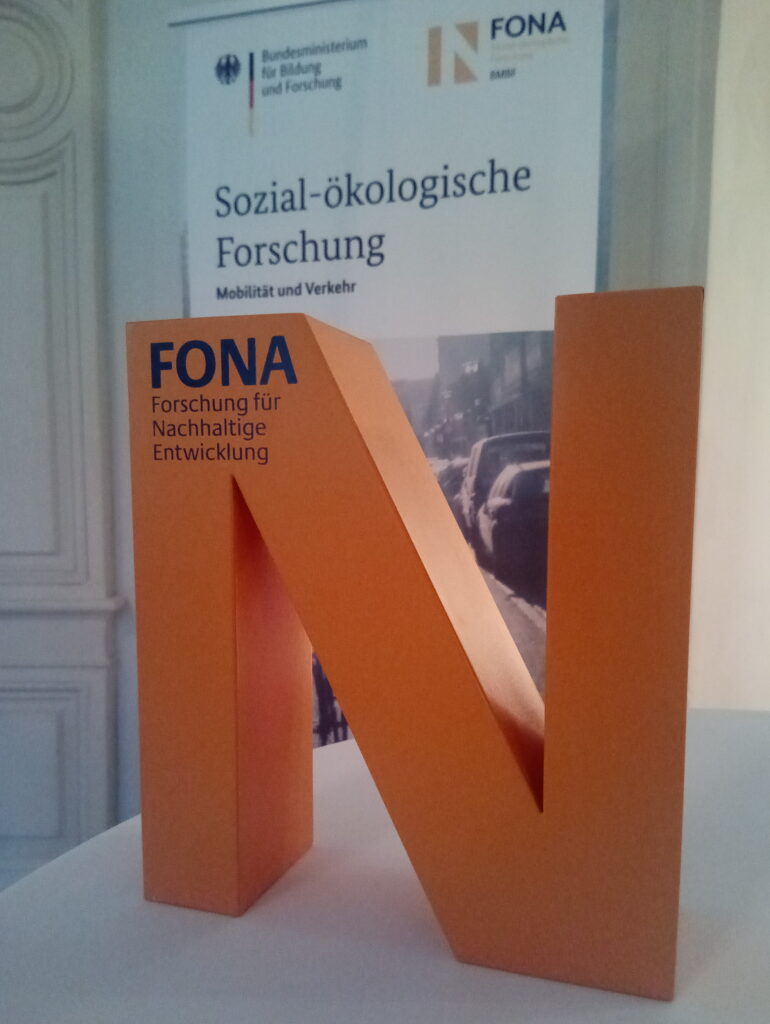
On 9 & 10 March 2020 the kick-off conference of all junior research groups took place that are funded by the BMBF programme on Research for Sustainable Development (FONA). At the moment there are about 20 junior research group that receive funding and that reported during the two-day conference.
As part of the latest funding round of 2019 we presented our group in the form of a presentation and a poster.
For an overview of all junior research group see the BMBF website.


